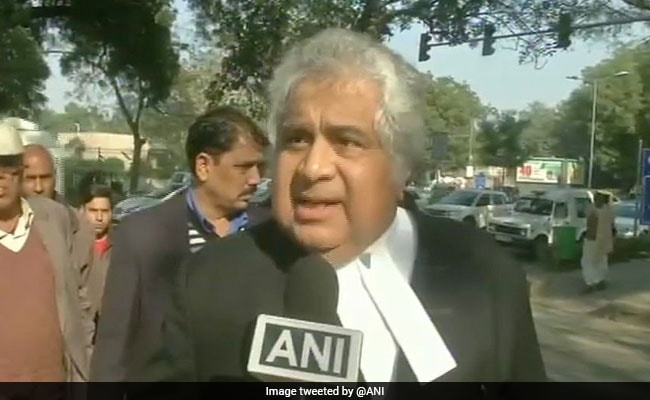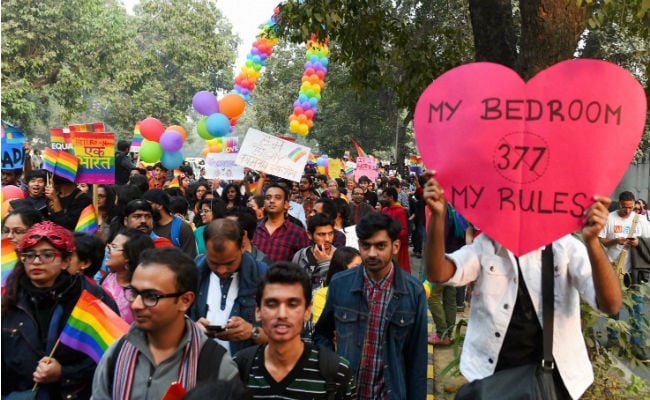8 years ago
New Delhi:
The Supreme Court today said that it will re-examine its verdict upholding Section 377 of the IPC that criminalises gay sex. A bench comprising Chief Justice Dipak Misra and Justices AM Khanwilkar and DY Chandrachud said the issue arising out of section 377 of the Indian Penal Code (IPC) required to be debated upon by a larger bench. Section 377 of the IPC refers to 'unnatural offences' and says whoever voluntarily has carnal intercourse against the order of nature with any man, woman or animal, shall be punished with imprisonment for life, or with imprisonment of either description for a term which may extend to ten years, and shall also be liable to pay a fine.
Here are the highlights:
26 nations across the world have decriminalised gay sex, says news agency PTI
According to news agency PTI, as many as 26 nations have decriminalised gay sex.
They are:
Australia
Malta
Germany
Finland
Colombia
Ireland
United States
Greenland
Scotland
Luxembourg
England and Wales
Brazil
France
New Zealand
Uruguay
Denmark
Argentina
Portugal
Iceland
Sweden
Norway
South Africa
Spain
Canada
Belgium
Netherlands
According to news agency PTI, as many as 26 nations have decriminalised gay sex.
They are:
Australia
Malta
Germany
Finland
Colombia
Ireland
United States
Greenland
Scotland
Luxembourg
England and Wales
Brazil
France
New Zealand
Uruguay
Denmark
Argentina
Portugal
Iceland
Sweden
Norway
South Africa
Spain
Canada
Belgium
Netherlands
Individuals shouldn't live in a state of fear, says Supreme Court
News agency PTI reported the Supreme Court as saying that people or individuals who exercise their choice should never "remain in a state of fear".
A bench comprising of Chief Justice Dipak Misra and Justices AM Khanwilkar and DY Chandrachud, said in a detailed order that the issue of criminalising consensual gay sex needed to be debated upon by a larger bench.
The bench also referred to the term in Section 377 of the Indian Penal Code (IPC) which is "carnal intercourse against the order of nature", and said that "the determination of order of nature is not a constant phenomenon".
The bench also said that social morality changes from age to age.
"What is natural to one may not be natural to the other but the said natural orientation and choice cannot be allowed to cross the boundaries of law and as the confines of law cannot tamper or curtail the inherent right embedded in an individual under Article 21 of the Constitution," the bench said.
News agency PTI reported the Supreme Court as saying that people or individuals who exercise their choice should never "remain in a state of fear".
A bench comprising of Chief Justice Dipak Misra and Justices AM Khanwilkar and DY Chandrachud, said in a detailed order that the issue of criminalising consensual gay sex needed to be debated upon by a larger bench.
The bench also referred to the term in Section 377 of the Indian Penal Code (IPC) which is "carnal intercourse against the order of nature", and said that "the determination of order of nature is not a constant phenomenon".
The bench also said that social morality changes from age to age.
"What is natural to one may not be natural to the other but the said natural orientation and choice cannot be allowed to cross the boundaries of law and as the confines of law cannot tamper or curtail the inherent right embedded in an individual under Article 21 of the Constitution," the bench said.

Senior lawyer, Harish Salve told news agency ANI that,"Section 377 is dead after the nine-judge bench which has said all these are dimensions of Right to Privacy. It will formally be struck down. It will be done very soon".
Soon after the decision of Supreme Court of re-examining the Section 377, people on twitter started posting about it:
#Section377 must go. It is antediluvian, an anachronism in our modern times.
- Sanjay Jha (@JhaSanjay) January 8, 2018
The whole idea of "Sexual Orientation by Birth as Gay" is yet to be decided conclusively by Scientific community #Section377 #LGBT . But NO Disrespect to Homosexuals
- Rahul Easwar (@RahulEaswar) January 8, 2018
Pls understand #Section377 can also be misused against Hetro sexuals wrt sex toys or oralor anal sex. That makes most of us criminals not just the LGBT s. Hence @mvadera & I were waiting for this & will move SC in an IA against #Section377 .
- Tehseen Poonawalla (@tehseenp) January 8, 2018
Cc @MPKTSTulsi@AshimaMandla
Section 377: All You Need To Know
Section 377 of the Indian Penal Code is an archaic law that was introduced during the British era in 1860s and makes gay sex a crime for which the punishment can be a life term.
- In 2009, the Delhi High Court had described Section 377 as a violation of the fundamental rights guaranteed by the constitution. Religious groups, however, had appealed against the decision in the Supreme Court.
- In 2013, the Supreme Court cancelled the Delhi high court order and re-criminalised homosexuality. It said that it was the job of the parliament to decide on scrapping laws.
- After the 2013 Supreme Court's decision, prominent BJP leader Rajnath Singh had said, "We support Section 377 because we believe that homosexuality is an unnatural act and cannot be supported." On the contrary, senior BJP leader Arun Jaitley had said, "When millions of people the world over are having alternative sexual preferences, it is too late in the day to propound the view that they should be jailed."
Supreme Court To Revisit 2013 Verdict Criminalising Gay Sex: 10 Points
A three-judge bench of Supreme Court headed by the Chief Justice of India, Dipak Misra, today said it would reconsider and examine the constitutional validity of the law referred to as Section 377.

A three-judge bench of Supreme Court headed by the Chief Justice of India, Dipak Misra, today said it would reconsider and examine the constitutional validity of the law referred to as Section 377.

- The top court acted on the petition by Aman Nath, the owner of Neemrana hotels, Navtej Johar, a classical dancer, celebrity chef Ritu Dalmia, former editor Sunil Mehra and restauranteur Ayesha Kapur.
- In 2013, the Supreme Court had cancelled a Delhi high court order that had decriminalized homosexuality by overturning the outdated law and said it was the job of parliament to decide on scrapping laws.
- That decision needs to be reconsidered because of constitutional issues, said the Supreme Court.
- Under the law, those convicted under Section 377 of the Indian Penal Code face up to 10 years in jail.
- The Supreme Court noted that "choice can't be allowed to cross the boundaries of law but the confines of law can't trample or curtail the inherent right embedded in an individual under Article 21, the right to life and liberty."
- Gay rights activists across the country exulted over the Supreme Court ruling that said "societal morality changes from age to age. Law copes with life and accordingly change takes place".
- The "section of people who exercise their choice should never remain in a state of fear", said the judges.

